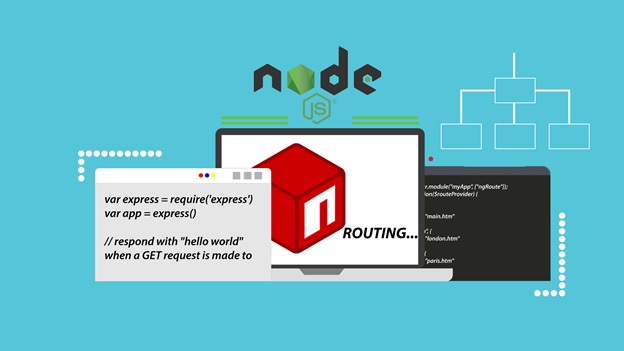The first-ever initial version of Node.js was released in 2009 and instantly gained a reputation among web developers, especially JavaScript developers. Industrial experts worldwide were stunned at how influential, resourceful, and fast this programming framework could be. Developers can use it to develop an in-house application and a server or backend of an application.
About NodeJs
NodeJs is fully event-driven. The server consists of one thread, processing a single event one after another. A new request/task or function call coming in is a sort of event. The server begins processing it, and when there is a blocking of Input/Output operation, it does not hold until it finishes and instead registers a callback request. The server then promptly begins to process the next event (maybe another call). When the Input/Output transaction gets completed, that is another class of event, and the server will treat it (i.e., proceed running the request) by executing the callback as quickly as it has time.
So the server never needs to generate new threads or shuffle among different threads, which means it has a minimal burden. If you want to make full use of recurring hardware cores, you begin with the multiple instances of node.js.
Scope of NodeJs
Nowadays, many software companies are adding Node.js to their main technology stack, and one of the primary reasons for this sensation is agility and execution. You can hire NodeJs developers online from anywhere in the world. For job seekers, there are a lot of remote and in-house job opportunities waiting for you.
But what makes this framework so fast? In this article, we will try to cover it with some important facts and figures.
Why is NodeJs so fast?
The first thought that comes to mind while we discuss Node.js is the execution speed. So, here we’ll try to understand how is Node.js faster than others? So, First of all, it’s necessary to understand what ‘execution speed’ truly means.
The definition of execution speed can vary from Fibonacci series calculation to querying database.
In the context of web development, execution speed is the thing required for processing requests and returning a response to the client. The time consumed on processing requests starts from the first connection and ends when the client receives the response.
There are some features of NodeJs that make it a fast runtime environment. Let’s move to the most important speed features of NodeJs.
Single-threaded Structure and Asynchronous nature
NodeJs is built single-threaded and asynchronous. Any input/output transaction never blocks the operation. It means that you can view data, send/receive emails, query a database, and perform other tasks simultaneously.
Every request doesn’t generate a separate Node process. On the opposite, there is only a single Node process continually running and waiting for the links. JavaScript gets executed in this process’s chief thread, and all the input/output processes get performed in separate threads, almost without delay.
V8 Virtual Machine
NodeJs relies on the V8 JS engine to execute the coding instructions, which we all understand and love. V8 is a JavaScript virtual machine formulated by Google for the Chrome browser. V8 is designed as such to make JavaScript run fast and give more speed than other racing engines. For a productive language without strict writing, delivering high performance is not a simple job. V8 and different engines are developing to face this challenge adequately.
The virtual machine in JavaScript V8 that executes JavaScript code has a JIT anthology. It determines that the methods that are requested regularly can be compiled into machine language, which will considerably increase the execution speed. When this virtual machine receives the source code, it can compile it immediately at the runtime.
Event Loop Mechanism
Anything occurring at the runtime of a system is called an event. An event loop is a build that is responsible for manipulating events in some programs. An event loop is always asynchronous concerning the communication source. If you call an input/output operation, NodeJs will preserve the callback connected with that operation and process other events. Once the required data is retrieved, only then will the callback be executed further.
NodeJs holds an event loop that manages all asynchronous transactions for you. It enables you to use a non-blocking input/output loop where threads can run multiple requests. While unable to treat one, it is effectively “held” as a promise. It means that without holding up other threads, the one next in the queue gets executed. It is in spite of the fact that NodeJs is a single-threaded environment. This entire process enables developers to handle more operations utilizing less memory and resources.
Summary
To summarize the discussion, NodeJs is lightweight and fast due to its construction built around event handling. Built to serve as a web server, NodeJs handles regular tasks very well. Communicating well with the kernel, it handles multi-thread operations too. It depends on the need of a web app development company as to which profile and budget are available to hire nodejs developers. It will depend on project to project as to which NodeJS web development services they will provide.
Many big companies have already had the chance to enjoy all the benefits of NodeJs. A great example is PayPal, which used NodeJs in its application. Many opportunities are waiting for you to enter the web development industry; with the essential skills of JavaScript frameworks, be ready to stay ahead.




